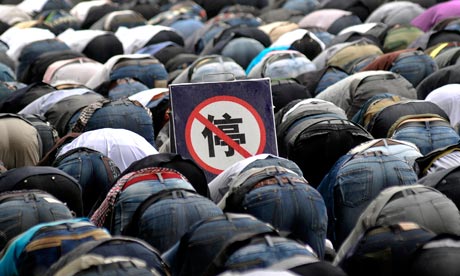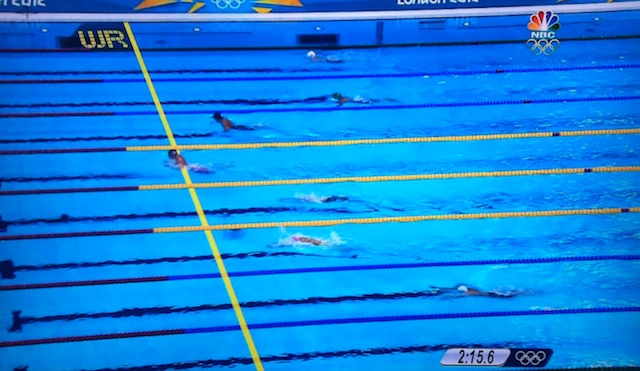Beijing accused of misguided attempt to secularise minority Uighurs by banning or discouraging civil servants, students and others from fasting

Muslims in Xinjiang offer Friday prayers near a no-stopping sign on the first day of Ramadan. Beijing says its attempts to restrict participation come out of health concerns.
China is discouraging some Muslims in Xinjiang from fasting duringRamadan. The government says the move is motivated by health concerns.
Several city, county and village governments in the far-western region have posted notices on their websites banning or discouraging Communist party members, civil servants, students and teachers from fasting during the religious holiday.
A regional spokeswoman, Hou Hanmin, was quoted in the state-runGlobal Times on Friday as saying authorities encourage people to "eat properly for study and work" but would not force anyone to eat during Ramadan.
Xinjiang is home to the Muslim Uighur ethnic group. Long-simmering resentment over the rule by China's Han majority and an influx of Han migrants has sporadically erupted into deadly violence.
Those familiar with the region say attempts to restrict participation in Ramadan are not new, but this year's campaign is more intense.
There is "a much more public and concerted effort" than in previous years and in some cases Communist party leaders are delivering food to village elders to try to get them to break their fast, according to Dru Gladney, a professor of anthropology at Pomona College in California and an expert on China's Muslim minorities.
"I think it is a misguided effort to try to secularise the Uighurs and my feeling is it will backfire," said Gladney. "It makes the Uighurs even more angry at the party for not honouring their religious customs."
Separatist sentiment is rife in Xinjiang, with some Uighurs advocating armed rebellion. A smaller fringe has been radicalised and trained in camps across the border in Afghanistan and Pakistan.
In July 2009, almost 200 people were killed during rioting between Uighurs and Han Chinese in Xinjiang's capital, Urumqi. Uighur activists say the riots were the result of decades of pent-up frustration with Chinese rule.
China has responded by boosting police presence and restricting the practice of Islam – moves that have increased tensions.
Over the last few months, authorities in Xinjiang have stepped up a campaign against illegal religious schools, which they believe are fomenting extremism and separatist thought.
Hou said battling religious extremism and terror in the region remained a priority.
"Religious extremism is closely related to violence and terrorism, and cracking down on these is one of our top priorities," the regional spokeswoman was quoted as saying.
Ilham Tohti, a Beijing-based Uighur economist, said this year's campaign against participation in Ramadan was being more strictly enforced, with officials in some areas requiring people to sign pledges that they will not take part in religious activities.
Tohti said the campaign appeared to be aimed solely at Uighurs in Xinjiang, noting that Kazakh and Hui Muslims in Xinjiang, as well as Uighurs outside the region, face no such restrictions.
At the Central University for Nationalities in Beijing, where he teaches, there have been no warnings against taking part in Ramadan and up to 70 Muslim students, including about 10 Uighurs, gather nightly at a local restaurant next to campus to break their fast, he said.
He said officials may be particularly nervous about potential unrest in Xinjiang in the lead up to a once-a-decade leadership transition in Beijing in the autumn.
"As a result they are tightening control measures in many areas, not just religion, but this could give rise to new problems and they may end up with an outcome that is the opposite of what they were seeking," he said.
On Monday, the US state department released a global report on religious freedom that criticized the authorities in Xinjiang for their "repressive restrictions on religious practices" and failure to "distinguish between peaceful religious practice and criminal or terrorist activities".
China's foreign ministry dismissed the report as biased and called it interference in Chinese affairs.

Muslims in Xinjiang offer Friday prayers near a no-stopping sign on the first day of Ramadan. Beijing says its attempts to restrict participation come out of health concerns.
China is discouraging some Muslims in Xinjiang from fasting duringRamadan. The government says the move is motivated by health concerns.
Several city, county and village governments in the far-western region have posted notices on their websites banning or discouraging Communist party members, civil servants, students and teachers from fasting during the religious holiday.
A regional spokeswoman, Hou Hanmin, was quoted in the state-runGlobal Times on Friday as saying authorities encourage people to "eat properly for study and work" but would not force anyone to eat during Ramadan.
Xinjiang is home to the Muslim Uighur ethnic group. Long-simmering resentment over the rule by China's Han majority and an influx of Han migrants has sporadically erupted into deadly violence.
Those familiar with the region say attempts to restrict participation in Ramadan are not new, but this year's campaign is more intense.
There is "a much more public and concerted effort" than in previous years and in some cases Communist party leaders are delivering food to village elders to try to get them to break their fast, according to Dru Gladney, a professor of anthropology at Pomona College in California and an expert on China's Muslim minorities.
"I think it is a misguided effort to try to secularise the Uighurs and my feeling is it will backfire," said Gladney. "It makes the Uighurs even more angry at the party for not honouring their religious customs."
Separatist sentiment is rife in Xinjiang, with some Uighurs advocating armed rebellion. A smaller fringe has been radicalised and trained in camps across the border in Afghanistan and Pakistan.
In July 2009, almost 200 people were killed during rioting between Uighurs and Han Chinese in Xinjiang's capital, Urumqi. Uighur activists say the riots were the result of decades of pent-up frustration with Chinese rule.
China has responded by boosting police presence and restricting the practice of Islam – moves that have increased tensions.
Over the last few months, authorities in Xinjiang have stepped up a campaign against illegal religious schools, which they believe are fomenting extremism and separatist thought.
Hou said battling religious extremism and terror in the region remained a priority.
"Religious extremism is closely related to violence and terrorism, and cracking down on these is one of our top priorities," the regional spokeswoman was quoted as saying.
Ilham Tohti, a Beijing-based Uighur economist, said this year's campaign against participation in Ramadan was being more strictly enforced, with officials in some areas requiring people to sign pledges that they will not take part in religious activities.
Tohti said the campaign appeared to be aimed solely at Uighurs in Xinjiang, noting that Kazakh and Hui Muslims in Xinjiang, as well as Uighurs outside the region, face no such restrictions.
At the Central University for Nationalities in Beijing, where he teaches, there have been no warnings against taking part in Ramadan and up to 70 Muslim students, including about 10 Uighurs, gather nightly at a local restaurant next to campus to break their fast, he said.
He said officials may be particularly nervous about potential unrest in Xinjiang in the lead up to a once-a-decade leadership transition in Beijing in the autumn.
"As a result they are tightening control measures in many areas, not just religion, but this could give rise to new problems and they may end up with an outcome that is the opposite of what they were seeking," he said.
On Monday, the US state department released a global report on religious freedom that criticized the authorities in Xinjiang for their "repressive restrictions on religious practices" and failure to "distinguish between peaceful religious practice and criminal or terrorist activities".
China's foreign ministry dismissed the report as biased and called it interference in Chinese affairs.
















